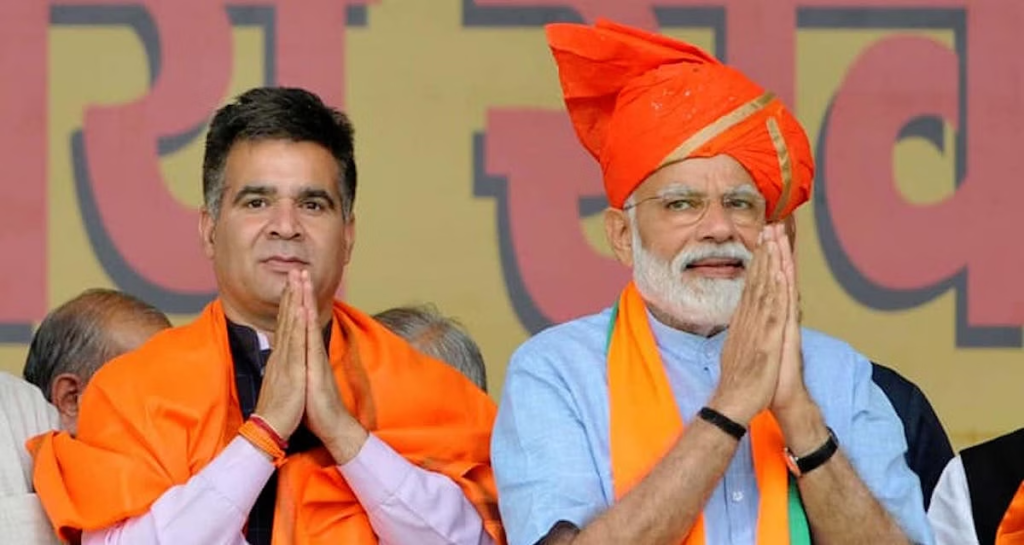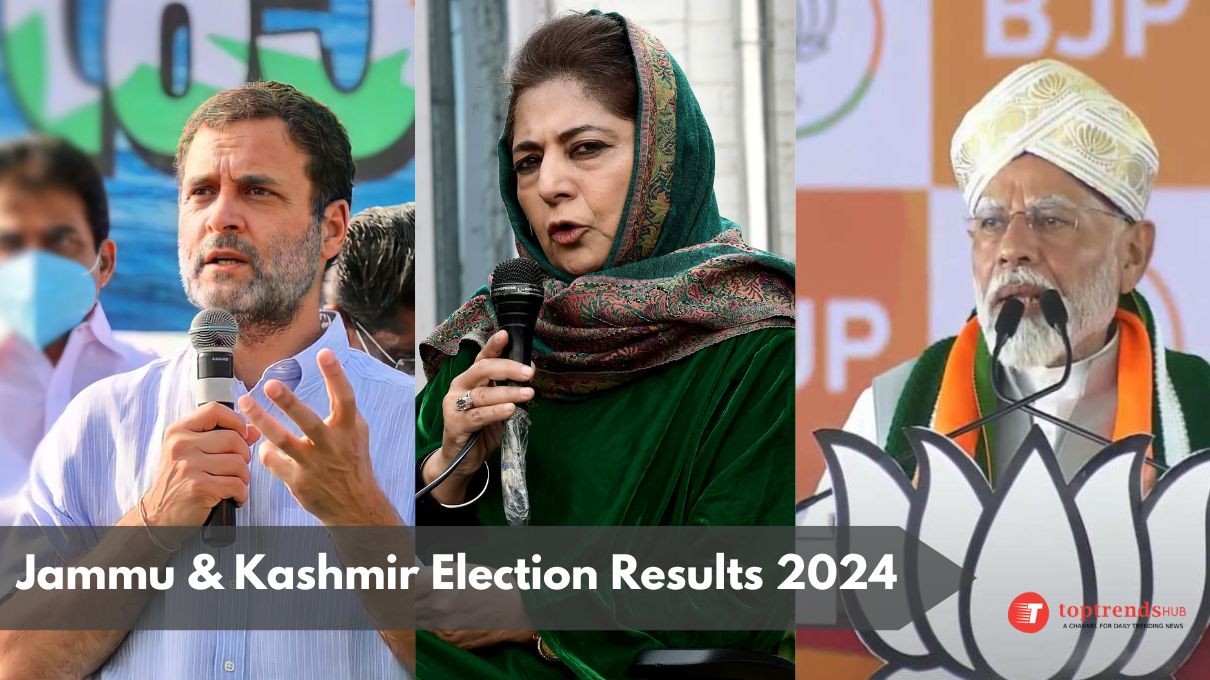Jammu and Kashmir election BJP Chief Ravinder Raina performed a yagya, displaying strong confidence in his party’s success as vote counting started for the Jammu and Kashmir assembly elections. He firmly believes that the BJP will secure a majority in the 90-member assembly, with support from Independent candidates likely boosting their numbers.
As the vote counting progressed on Tuesday morning, initial trends placed the Congress-National Conference alliance slightly ahead of the BJP. Despite this, Raina remained optimistic and assured that the BJP, together with its allies and Independent candidates, will form the government. He confidently projected the BJP would win around 30-35 seats, while Independent candidates would likely contribute another 15. With this combined strength, they aim to surpass the crucial 50-seat mark and secure a solid majority.
Speaking to reporters, Raina, the BJP candidate from Nowshera, expressed certainty about the party’s strategy. He further clarified the process of nominating five MLAs by the Lieutenant Governor, explaining that it follows the provisions outlined in the State Reorganisation Act 2019. He criticized Congress for suddenly raising concerns about this now, pointing out that the provisions were debated and passed in Parliament long ago.

As the election continues to unfold, 873 candidates actively compete for seats, paving the way for Jammu and Kashmir’s first elected government since the removal of Article 370. Tight security surrounds all 20 counting centers across the region to ensure a smooth process. In a sharp critique, Raina questioned Congress leader Rahul Gandhi and NC chief Farooq Abdullah for their silence during the debates on the reorganization bill in Parliament. He accused them of creating unnecessary controversy as vote counting moves forward.
J&K Elections 2024: NC-Congress Crosses Majority, BJP Leading in 30 Seats
The 2024 Jammu and Kashmir assembly election, the first since the abrogation of Article 370 in 2019, has the National Conference-Congress (NC-Congress) alliance crossing the majority mark, with early trends showing a significant lead over the BJP. This election, held after a decade, holds great importance for the region’s political landscape.
Initial results reveal the NC-Congress alliance pushing ahead with over 48 seats, while the BJP follows closely, leading in 30. Reports from various sources highlight the NC-Congress coalition taking a clear advantage, with some showing the alliance at 46 seats and the BJP at 29. The numbers keep fluctuating, but the NC-Congress alliance continues to maintain its lead.
This election has been a historic one for Jammu and Kashmir. A voter turnout of 63.88% showcases the people’s active participation, reflecting their strong desire for a stable government. Held in three phases on September 18, 25, and October 1, the election process remained smooth and peaceful, without any violence or disruptions. Political parties and candidates completed their campaigns without facing any major challenges.
Exit polls indicated the NC-Congress alliance would gain an edge. According to the C-Voter survey, the alliance was expected to win between 40 and 48 seats in the 90-member assembly, putting it near the majority mark. This election not only serves as a key moment for Jammu and Kashmir but also symbolizes the first step toward re-establishing democratic governance in the region since Article 370 was revoked.
J&K Assembly Election Results: Congress-NC Alliance Leads in a Historic Moment
The Jammu and Kashmir Assembly elections, held after a gap of 10 years following the abrogation of Article 370, have entered a critical phase today as votes continue to be counted across the region. The Congress-National Conference (NC) alliance is currently leading in the majority of seats. Both parties are pushing hard to secure a clear mandate and take charge of the region’s new government.
As the results unfold, the Congress-NC alliance stands out as the most dominant force in J&K politics, surging ahead in both exit polls and early results. Voters across the Union Territory showed up in significant numbers, participating in an election of immense importance for the future of the region. With over a decade without a state government, Jammu and Kashmir looks forward to electing representatives who will play a crucial role in shaping its future. This prospect has ignited fierce competition among the key players in the political arena.
Congress-NC Alliance Takes the Lead: A Closer Look
At this point, the Congress-National Conference alliance is steadily emerging as the largest pre-poll alliance in the state. Early trends indicate their dominance, suggesting that they may outperform expectations. Although the exit polls had predicted a close race, many believed that a hung assembly was likely. However, the Congress-NC partnership has managed to gain significant ground as more votes come in. This success marks a major moment for Jammu and Kashmir’s political scene, where strong alliances are proving to be essential for securing electoral success.
The Congress-NC alliance has a deep-rooted history, but its importance in this election cannot be overstated. By joining forces, Congress and NC positioned themselves as a formidable challenge to the Bharatiya Janata Party (BJP) and other local contenders like the People’s Democratic Party (PDP). The alliance is widely viewed as a symbol of unity in their fight against central interference and their commitment to the political autonomy of Jammu and Kashmir.
Election Phases and Voter Turnout: A Resounding Success
Voter participation during all three phases of the election reached impressive levels, further solidifying the significance of this election. In the first phase, the voter turnout reached a remarkable 61%, signaling high levels of public engagement. Phase 2 recorded a turnout of over 57%, while the final phase saw an even higher turnout of 69.65%. These numbers clearly demonstrate the people’s growing interest in influencing the region’s future, especially after the significant political changes following the abrogation of Article 370.
Chief Electoral Officer P.K. Pole highlighted the peaceful nature of the elections, commending the enthusiastic participation from voters. These substantial turnout numbers underscore that people in Jammu and Kashmir are eager to exercise their democratic rights, especially after years of political uncertainty and governance gaps.
Political Parties’ Strategies and Campaigns
The key political parties invested heavily in their campaign strategies, recognizing the high stakes involved in these elections. The Congress-NC alliance focused on restoring Jammu and Kashmir’s political autonomy while actively countering the influence of the central government. Leading the charge, NC leader Omar Abdullah emphasized transparency, promising a government that would directly address local needs and aspirations.
Meanwhile, the BJP aimed to integrate Jammu and Kashmir more closely with the rest of India. Their campaign relied heavily on promises of national-level development projects and investments, assuring voters that the abrogation of Article 370 had set the stage for long-term growth and stability. The BJP hoped that these initiatives would resonate with the electorate, positioning themselves as champions of development.
On the other hand, the PDP, led by Mehbooba Mufti, played a more oppositional role, directing much of their efforts against the BJP’s policies. Their campaign aimed at rallying support for a return to Jammu and Kashmir’s previous autonomous status. However, the PDP’s messaging appeared to struggle in comparison to the Congress-NC alliance, which seemed to capture more attention and gain traction among voters.
Accusations and Tensions: A Heated Battle
Like any high-stakes election, this one saw its share of controversies and accusations flying between parties. The Congress repeatedly accused the BJP of trying to manipulate the election results to favor their agenda. With tensions running high, Congress leaders warned against any attempts to undermine the people’s mandate, stressing that the will of the electorate should stand unquestioned. Omar Abdullah echoed these concerns, calling for vigilance against any efforts to interfere in the election process.
In contrast, the BJP displayed confidence, insisting that their performance in the region would yield a strong showing. J&K BJP President Ravinder Raina highlighted the work his party had done for the people of Jammu and Kashmir, maintaining that these efforts would translate into electoral success. The BJP remained optimistic, banking on their development narrative to win over voters.

Results and Trends: Tracking the Battle
As of 10 a.m., the Congress-National Conference alliance led in 41 seats, followed by the BJP trailing behind with 22, while Congress saw gains in 8 constituencies. The PDP, which was once a major political player in the region, is now leading in just 3 seats. Smaller parties and independent candidates are also making an impact, with 9 independents leading in their respective constituencies. The J&K People’s Conference, another local party, also secured a few important leads.
Among the high-profile candidates, Omar Abdullah remains a significant figure. He leads in Budgam and Ganderbal, solidifying his position in the region. However, Iltija Mufti, daughter of PDP leader Mehbooba Mufti, currently trails in the Srigufwara-Biejbehara constituency, showcasing the shifting political dynamics within the region.
Looking Ahead: The Possibility of a Hung Assembly
Although the Congress-NC alliance maintains a lead, there remains a strong possibility of a hung assembly if their seat tally falls short of a majority. This scenario would likely open the door to post-poll negotiations and the formation of new alliances. It’s possible that smaller parties and independent candidates will play a critical role in deciding who governs the state.
In such a situation, all eyes will be on potential coalitions. Both Congress and NC have indicated they would be open to forming post-poll alliances, but their strategy for doing so remains a closely guarded secret. Political observers expect that behind-the-scenes talks will intensify as the final results are announced.
Conclusion: The Future of J&K Politics
The 2024 Jammu and Kashmir Assembly elections represent a major turning point for the region. As the vote count nears completion and political parties prepare for the final results, one thing remains clear—this election will shape the future of Jammu and Kashmir for years to come. Whether the Congress-NC alliance secures a majority or a hung assembly becomes the reality, the political landscape of Jammu and Kashmir is set to undergo significant changes.

Ultimately, the real winner in this election may be the democratic process itself. With an overwhelming voter turnout and a renewed commitment to electing local representatives, the people of Jammu and Kashmir have shown their readiness to participate in a new era of governance. The coming days will determine who gets to lead the region, but the collective voice of the electorate has already marked a victory for democracy.




